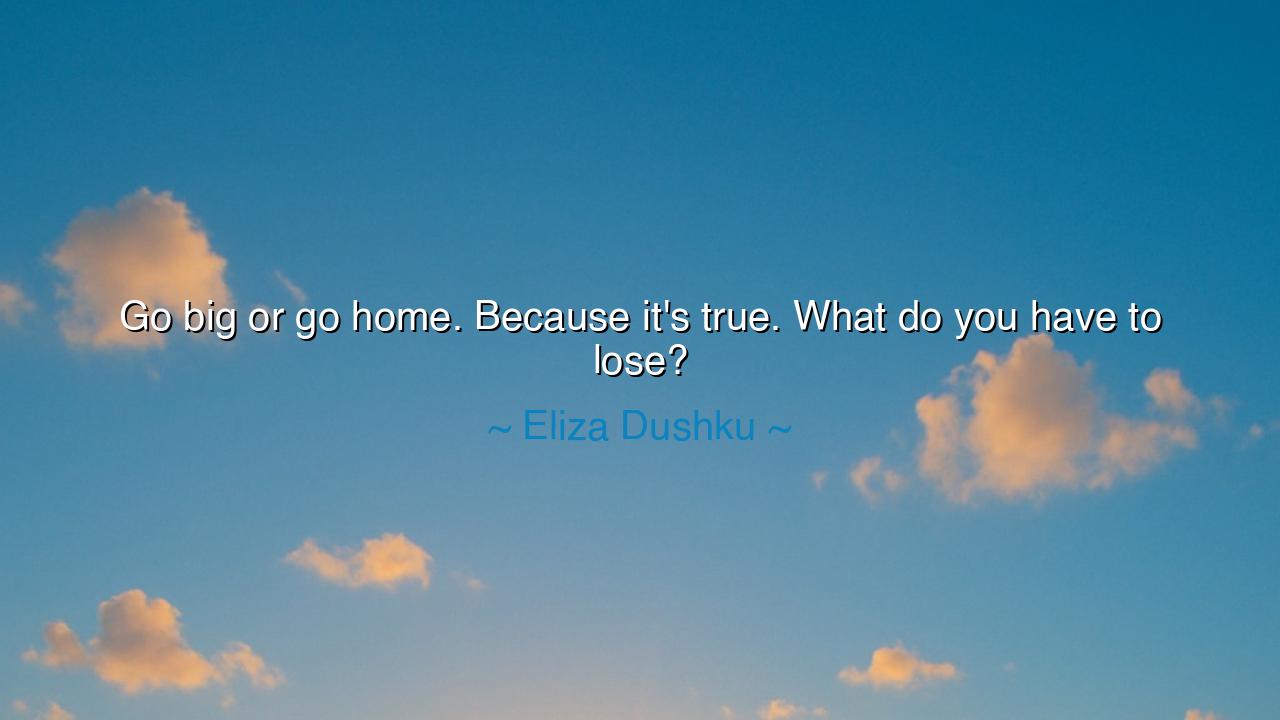
Go big or go home. Because it's true. What do you have to lose?






The words of Eliza Dushku, when she declares, “Go big or go home. Because it’s true. What do you have to lose?”, are not mere bravado. They are a call to the courageous heart, a trumpet sounded on the battlefield of life. It is the creed of those who dare to step beyond fear — who refuse to live small, or to shrink from the greatness that calls to them. Beneath its simple phrasing lies the eternal truth known to warriors, poets, and dreamers alike: that to live half-heartedly is to die before one’s time, and that the soul finds its highest song only when it risks everything for what it loves.
In the tongue of the ancients, this spirit was called audacia — the noble daring that separates the timid from the timeless. “Go big” is not a command to recklessness, but to fullness — to give all that one has, to pour every ounce of strength and fire into the work, the dream, the love that defines one’s life. To “go home,” in contrast, is to retreat into the shadows of comfort, to seek safety over meaning. Eliza’s words burn with defiance against mediocrity. They remind us that in the brief span of human existence, there is no greater sin than hesitation, for hesitation kills both vision and possibility.
Consider the tale of Alexander the Great, who, when offered the choice between a cautious kingdom and a daring conquest, chose to ride eastward toward the edge of the known world. His teachers warned him of the dangers; his soldiers feared the endless deserts and mountains. Yet Alexander, aflame with the certainty that destiny favors the bold, pressed on. When his men begged to turn back, he burned his ships upon the shores of the Indus and said, “Now we go forward — or we perish.” In that act lived the essence of go big or go home. For Alexander knew that greatness cannot be born from safety — it is forged only in the fire of risk.
To “go big” is not always to conquer nations or build empires. Sometimes, it is to speak one’s truth when silence would be easier. Sometimes, it is to love when the heart has been wounded, or to try again when failure has broken the spirit. The scale of the act does not matter — what matters is the totality of the heart behind it. Those who live fully, even for a day, know more of life’s beauty than those who exist cautiously for a hundred years.
There is a quiet wisdom, too, in the second part of her words: “What do you have to lose?” It reminds us that much of what we fear — judgment, failure, rejection — is but an illusion. Time strips all away, leaving only the question of whether we dared to live while we could. As the Roman philosopher Seneca wrote, “It is not that we have little time, but that we waste much.” Eliza’s challenge pierces this same truth: that the real danger lies not in risk, but in regret. To refuse the call of courage is to deny the gift of existence itself.
So let these words be carved into the hearts of those who hesitate at the threshold of their dreams. When faced with doubt, ask not, “What if I fail?” but rather, “What if I never try?” Life rewards not the perfect, but the brave. Every mountain climbed, every song sung, every invention, every act of love — all were born from the souls who said, “I will go big, for I have nothing to lose but my smallness.”
The lesson is clear: risk is the language of life. To live fully, one must be willing to step into uncertainty with faith, to replace comfort with conviction. Let each person rise each morning and ask: “What great thing will I dare today?” And when fear whispers its tired counsel, remember Eliza’s challenge — to either rise in glory or return untested. For the path of greatness is not for the cautious, but for those who leap with fire in their hearts and destiny in their eyes. Go big, or go home — for only in the first choice does the human spirit truly live.






AAdministratorAdministrator
Welcome, honored guests. Please leave a comment, we will respond soon